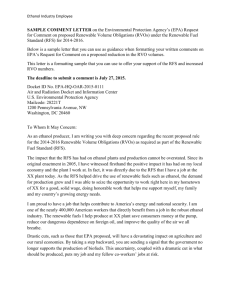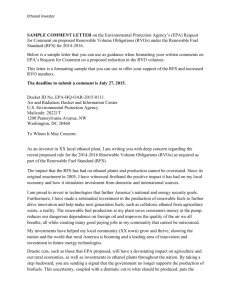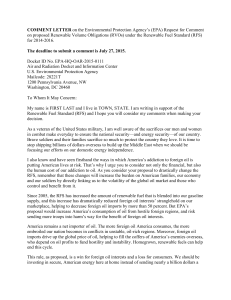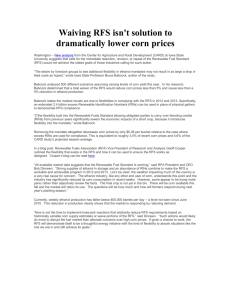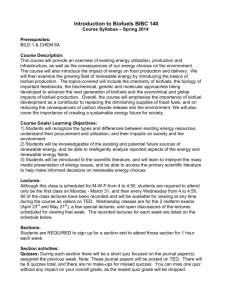SAMPLE COMMENT LETTER on EPA`s Request for Comment on
advertisement
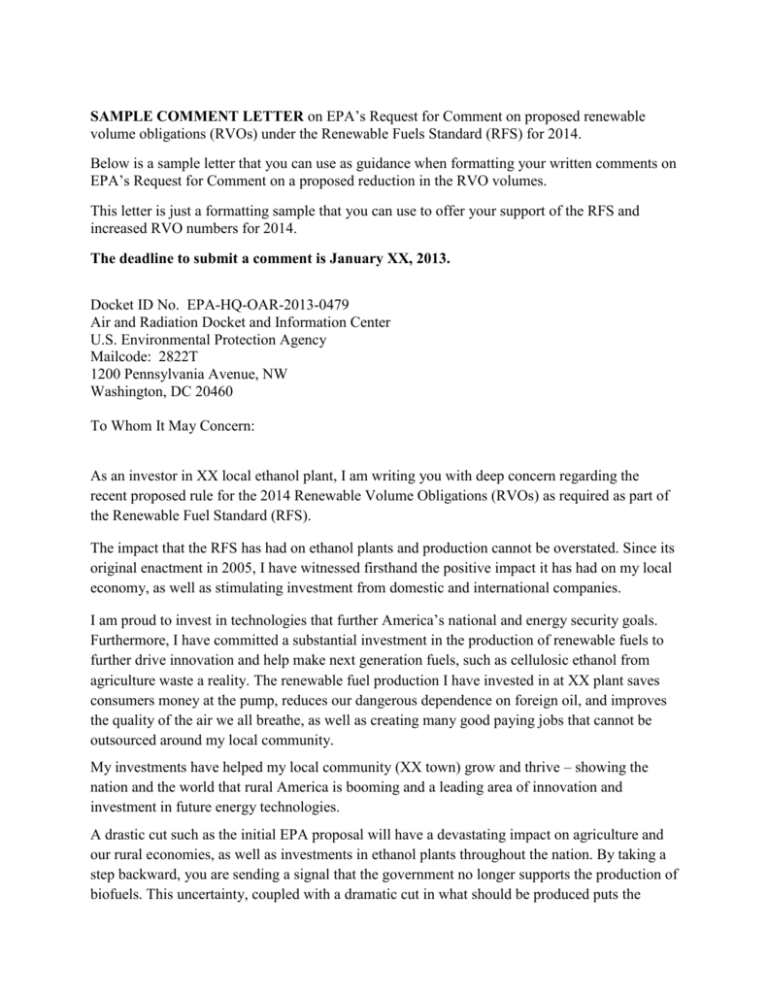
SAMPLE COMMENT LETTER on EPA’s Request for Comment on proposed renewable volume obligations (RVOs) under the Renewable Fuels Standard (RFS) for 2014. Below is a sample letter that you can use as guidance when formatting your written comments on EPA’s Request for Comment on a proposed reduction in the RVO volumes. This letter is just a formatting sample that you can use to offer your support of the RFS and increased RVO numbers for 2014. The deadline to submit a comment is January XX, 2013. Docket ID No. EPA-HQ-OAR-2013-0479 Air and Radiation Docket and Information Center U.S. Environmental Protection Agency Mailcode: 2822T 1200 Pennsylvania Avenue, NW Washington, DC 20460 To Whom It May Concern: As an investor in XX local ethanol plant, I am writing you with deep concern regarding the recent proposed rule for the 2014 Renewable Volume Obligations (RVOs) as required as part of the Renewable Fuel Standard (RFS). The impact that the RFS has had on ethanol plants and production cannot be overstated. Since its original enactment in 2005, I have witnessed firsthand the positive impact it has had on my local economy, as well as stimulating investment from domestic and international companies. I am proud to invest in technologies that further America’s national and energy security goals. Furthermore, I have committed a substantial investment in the production of renewable fuels to further drive innovation and help make next generation fuels, such as cellulosic ethanol from agriculture waste a reality. The renewable fuel production I have invested in at XX plant saves consumers money at the pump, reduces our dangerous dependence on foreign oil, and improves the quality of the air we all breathe, as well as creating many good paying jobs that cannot be outsourced around my local community. My investments have helped my local community (XX town) grow and thrive – showing the nation and the world that rural America is booming and a leading area of innovation and investment in future energy technologies. A drastic cut such as the initial EPA proposal will have a devastating impact on agriculture and our rural economies, as well as investments in ethanol plants throughout the nation. By taking a step backward, you are sending a signal that the government no longer supports the production of biofuels. This uncertainty, coupled with a dramatic cut in what should be produced puts the future of investment, growth and innovation of renewable fuels at risk. I know, with such uncertainty surrounding the RFS, I will likely scale back, if not completely withdraw my investments to prevent future losses. The ramifications for the industry and for towns and communities that count on these facilities to generate economic activity would be widespread and very damaging. When there is uncertainty and increased risk, investments by nature will dry up quickly – resulting in progress in the area of renewable fuels to fall short of its full potential. Furthermore, if the EPA and the government turn its back on the production of current conventional biofuel, it will have a devastating effect on the full-scale commercialization of next generation biofuels, such as cellulosic biofuel from feedstocks such as agricultural waste. The biofuels industry is right on the cusp of breaking through, making commercialized production a reality and now would be the worst possible time to take a step backward. As an investor that works closely with XX plant(s), I know the requirement of 14.4 billion gallons of ethanol can easily be met – 13.3 billion gallons can be consumed as E10, leaving just 1.1 billion gallons which can be met with increased use and sale of E85 and E15, as well as carry-over RINs or increased amounts of biodiesel. When the RFS was established, it always envisioned ethanol blends above 10 percent – even with decreasing gasoline consumption, but oil companies are doing everything they can to maintain their stranglehold on the nation’s fuel supply. With this flawed proposal, EPA is fundamentally changing how the RFS works by putting the burden of fuel distribution on biofuel producers rather than the oil refiners and integrated marketers who control 50 percent of the convenience stores in this country. The bottom line is that this proposal would have a devastating ripple effect on investment in ethanol plants, their production and the jobs they support – as well as the surrounding communities. With less money, there is a smaller tax base – our schools, hospital and local municipal services will suffer. During a time of economic uncertainty we need to capitalize on the opportunities, such as biofuel production to spur investment and innovation to keep America, and our rural economy strong. This is not an exaggeration, it is the reality. As you move forward in putting together a final rule, I hope you will consider the fallout if a rule, such as the one proposed would have on investors and the workers who count on their jobs at the ethanol production facilities around the country. Sincerely, Name and location
